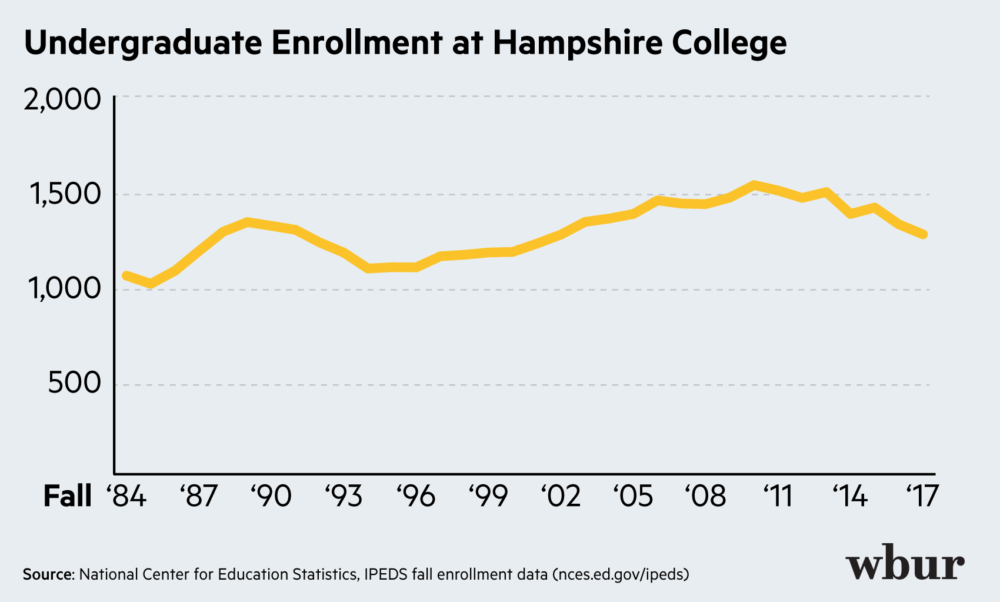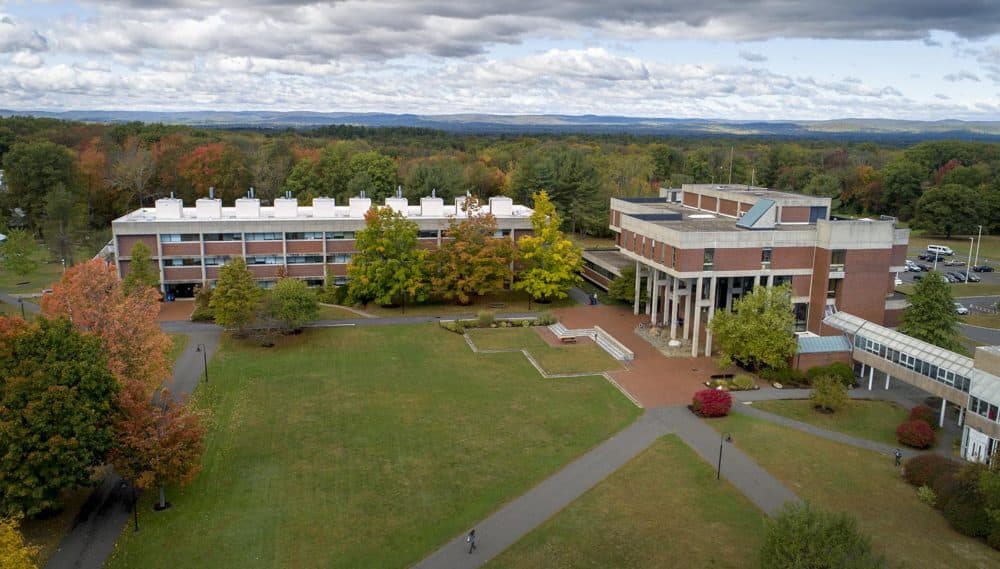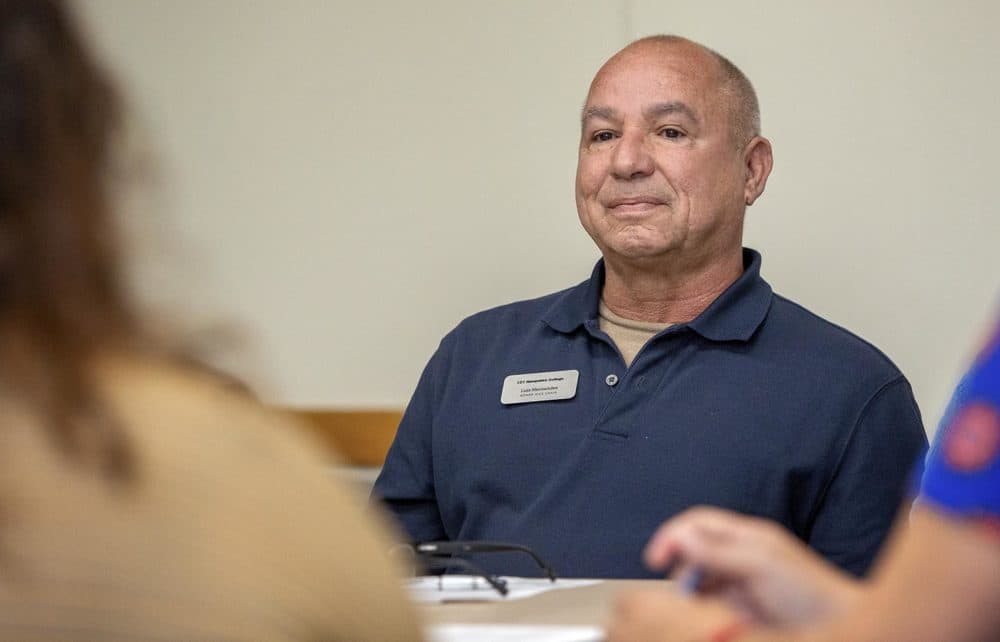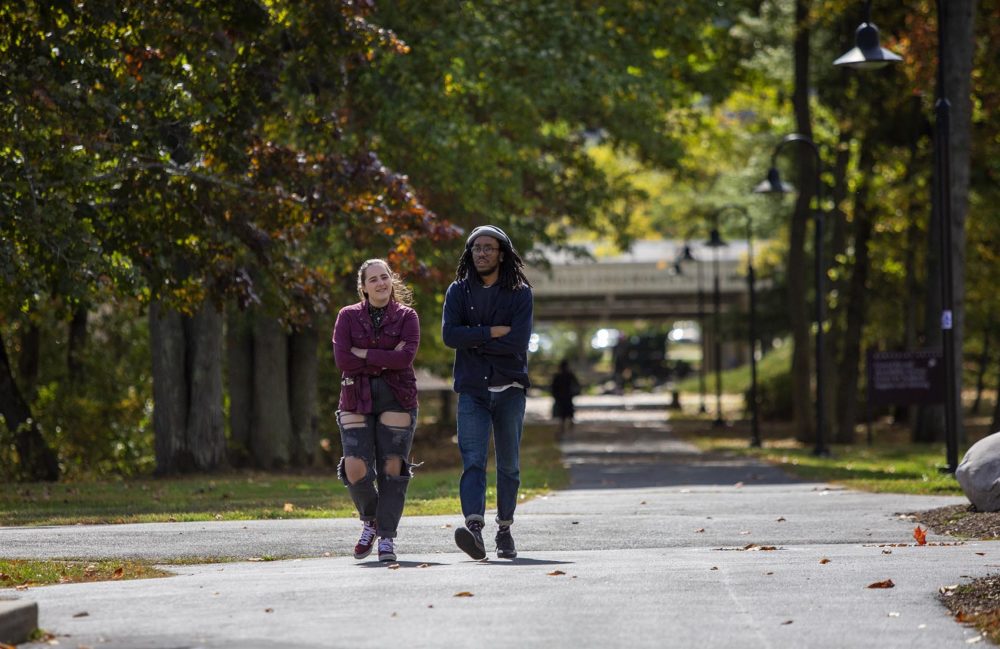Advertisement
Small Colleges, Big Challenges
What's Gained — And Lost — When Small Colleges Merge

Part 2 in a series.
Hampshire College has been struggling financially for years. But officials like Luis Hernandez, chair of the school's board of trustees, said things hit "crisis mode" in May 2018 when 77 fewer students enrolled than expected.
"We were really wondering: 'How do we survive?' " he said.
Being down by that many students meant the school would have to do without about $3.4 million in tuition. That shortfall left a budget gap so wide that Hernandez said he and other college leaders weren’t sure if they’d be able to cover payroll through the next school year.
By the following January, then-President Miriam Nelson went public with the school’s financial issues.
"There are stiff headwinds right now facing small liberal arts colleges. And certainly Hampshire is not immune to those headwinds," said Nelson at a press conference. She told reporters that school leadership was seriously considering a merger. "Finding a long-term strategic partner is in the best interest of Hampshire College."
In addition, the board of trustees was considering not accepting a full freshman class for the next school year.

The news hit the tight-knit Hampshire College community hard.
"I would rather be an alum of a college that really did end up closing, but stuck by its principles the entire time that it was open," alum Skye Landgraf told New England Public Radio shortly after the press conference.
Over the next few months, students organized protests, a 75-day sit-in at the president’s office and a vote of no confidence in Nelson. She eventually resigned, along with nine other trustees, for a wide range of reasons.
Interested in more education news? Join our WBUR Ed Talk Facebook group.
Many in the school community said they were afraid the college would lose its character if it merged with another institution.
In the world of higher education, Hampshire College is pretty unique. The 50-year-old school doesn’t accept standardized tests in admissions, students get written evaluations instead of grades, and they complete in-depth projects instead of choosing a major.
Advertisement
"It gets a lot of flak sometimes for being a school that has no grades and no rules," Landgraf explained, "but I think that’s what makes Hampshire special."

But with the school in financial crisis, many people, like student Luke Gannon, have been left weighing serious questions: What’s more important? Staying open or preserving everything that makes Hampshire the school they fell in love with?
"I think if we merge, especially with a school like the University of Massachusetts, our values are going to change," said Gannon. "But on the other hand, I don't want us to completely go off the grid."
For Hampshire College leadership, like board chair Hernandez, either option —finding a partnership or remaining independent — presented huge risks.
"With a partnership we may lose our sense of identity," he said. "But staying independent, are we going to be able to be financially stable to maintain the institution?"

In the end, the board of trustees voted to keep the college independent and double down on fundraising efforts.
The school launched a new fundraising campaign this year with the goal of raising $20 million by 2020 and $100 million by 2025.
But Hernandez stressed that vote to remain independent doesn’t mean things will stay the same at the school. With increased scrutiny by accreditors, who have raised concerns about the school's financial and leadership stability, Hampshire leaders are working on plans to dramatically revamp their academics.
Still, Hernandez is optimistic about Hampshire's current trajectory. He explained a merger would have taken too much away from Hampshire’s mission.
"Smaller institutions do lose their identity," Hernandez said. "You [are] now ... part of the larger body."

Other college leaders who have gone through mergers in New England said that sentiment isn't totally off base.
"I’d be disingenuous to say that [the school] didn’t change. It does change," said David Chard, former president of Wheelock College, a more than century-old teachers' training college in Boston. When Wheelock merged with Boston University in 2018, Chard said it was also a painful and emotional process. Joining a larger community comes with both benefits and challenges.
"You’re not going to be the same place, and I think we’ve gone through the grief of that process," he said. (Disclosure: Boston University owns the broadcast license for WBUR.)
Overall, Chard said the partnership with Boston University has been mostly good for Wheelock and its legacy. That’s due, in part, because of the fact that Wheelock specialized in early education, and that focus added value to the larger institution.
It seems no matter what direction colleges ultimately take in this situation, change is inevitable. The big question is how much a school community is willing to give up to avoid closing.
Do you have questions about small private colleges in Massachusetts? Fill out the form below:
Illustration by Chris Cerrato for WBUR.
This segment aired on October 21, 2019.
